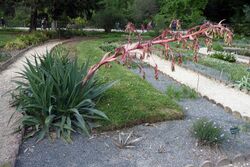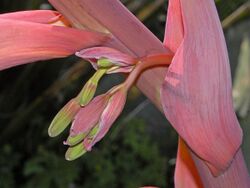Biology:Beschorneria yuccoides
| Beschorneria yuccoides | |
|---|---|

| |
| Beschorneria yuccoides subsp. yuccoides | |
| Scientific classification | |
| Kingdom: | Plantae |
| Clade: | Tracheophytes |
| Clade: | Angiosperms |
| Clade: | Monocots |
| Order: | Asparagales |
| Family: | Asparagaceae |
| Subfamily: | Agavoideae |
| Genus: | Beschorneria |
| Species: | B. yuccoides
|
| Binomial name | |
| Beschorneria yuccoides K.Koch
| |
Beschorneria yuccoides is a species of succulent plant belonging to the family Asparagaceae, subfamily Agavoideae.
Etymology
The epithet yuccoides is a compound of the botanical name of the genus Yucca and the Greek suffix -ό-εἶδος (o-eidos) oides meaning "likeness".[1]
Subspecies
- Beschorneria yuccoides subsp. yuccoides
- Beschorneria yuccoides subsp. dekosteriana (K.Koch) Govaerts
Description
Beschorneria yuccoides is a stemless plant with 20 to 35 linear, lanceolate, leathery leaves that are widened at their base. They are gray-green to green, about 40–60 cm (16–24 in) long and 3.3–3.5 cm (1.3–1.4 in) wide. The leaf margins are finely denticulate. The inflorescence reaches a height of 100–180 cm (39–71 in), with a maximum of 320 cm (130 in). The stem and the bract are red. The flowers are 40 to 50 mm long. The fruits are elongated to almost spherical, 30–40 mm (1.2–1.6 in) long and 15–25 mm (0.59–0.98 in) wide.[2][3]
Distribution
Beschorneria yuccoides is present in Mexico,[4] in the states of Hidalgo, Puebla and Veracruz, at an elevation of 2,700–3,000 m (8,900–9,800 ft) above sea level.[5]
Cultivation
This plant is not tolerant of severe freezes, and is best suited to warm, sheltered south- or west-facing places in full sun, where temperatures do not fall below −5 °C (23 °F). Alternatively, it can be grown under glass.
It grows outdoors at Earlscliffe, Howth, County Dublin, Ireland, at a latitude of 53.3º N, where it benefits from the unusually favourable microclimate.[6]
In cultivation in the United Kingdom it has gained the Royal Horticultural Society’s Award of Garden Merit.[7]
References
- ↑ Urs Eggli, Leonard E. Newton: Etymological Dictionary of Succulent Plant Names. Springer, Berlin/Heidelberg 2010, ISBN:978-3-642-05597-3, S. 263.
- ↑ RHS A-Z encyclopedia of garden plants. United Kingdom: Dorling Kindersley. 2008. p. 1136. ISBN:1405332964
- ↑ {{citation | mode = cs1 | title = Beschorneria yuccoides | work = Germplasm Resources Information Network (GRIN) | url = | publisher = [[Organization:Agricultural Research ServAgricultural Research Service (ARS), United States Department of Agriculture (USDA) | access-date = 23 January 2018 }}
- ↑ Encyclopedia of Life
- ↑ Eggli, Urs (17 July 2001). Illustrated Handbook of Succulent Plants: Monocotyledons. Springer Science & Business Media. ISBN 9783540416920. https://books.google.com/books?id=1bjwYOO_Zt0C&dq=Beschorneria+yuccoides+hidalgo+puebla+veracruz&pg=PA77.
- ↑ "Plants that thrive at Earlscliffe'". Earlscliffe. http://www.earlscliffe.com/plants_that_grow_well.htm. Retrieved 15 May 2018.
- ↑ "RHS Plantfinder - Beschorneria yuccoides". Royal Horticultural Society. https://www.rhs.org.uk/Plants/27870/i-Beschorneria-yuccoides-i/Details. Retrieved 12 January 2018.
- Biolib
- Urs Eggli The International Plant Names Index
External links
| Wikimedia Commons has media related to Beschorneria yuccoides. |
Wikidata ☰ Q829616 entry
 |


